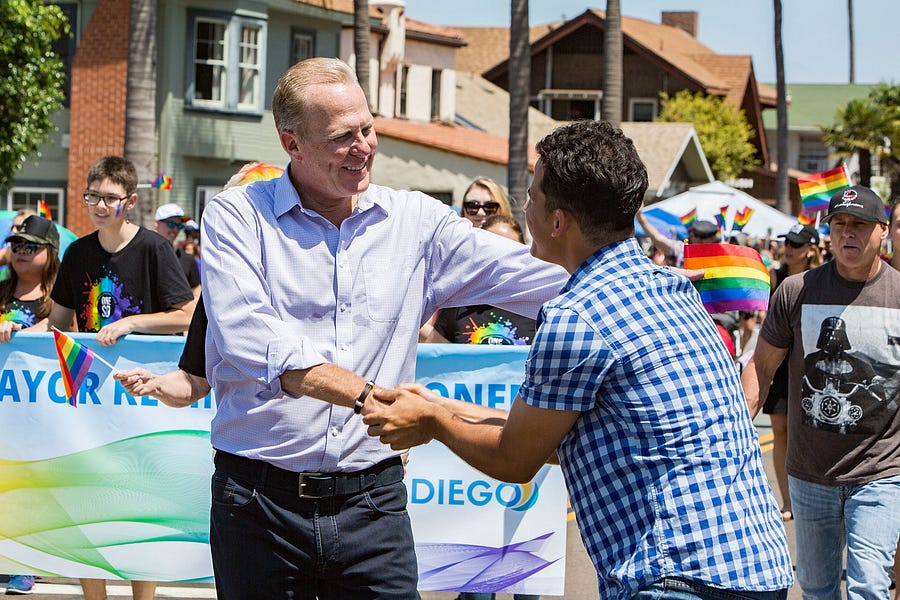Democrats dominate California politics at both the state and national level. They have controlled both houses of the state legislature almost nonstop since 1970, and the state’s U.S. congressional delegation currently has 45 Democrats compared with seven Republicans. But in San Diego, one Republican has defied the state’s progressive tilt. Republican Kevin Faulconer won a special election to serve as San Diego’s mayor in 2014 and clinched a full term in 2016. He was prevented by term limits from running again this fall. Faulconer sat down with The Dispatch to discuss how he won as a Republican in a Democratic-leaning city, his potential bid for governor, his criticisms of California’s coronavirus response (and Gov. Gavin Newsom’s infamous dinner at French Laundry), what his conception of a “California Republican” is, and the challenges he thinks the Golden State needs to address. The following has been edited for length and clarity.
Sutton: You’ve come out pretty hard against Gavin Newson this past week. Can you talk me through your criticisms of the coronavirus response in California and specifically Gov. Newsom’s?
Faulconer: You know, Californians are hurting. There’s so much frustration over the shifting rules and the fact that the governor doesn’t follow his own rules—people are hurting, small businesses are hurting. And when you see that there’s rules for everybody except for the governor, I think people are just hitting a breaking point. Everybody’s doing their best to stay healthy, to stay safe. But when we see, for example, a curfew that just came out last week, it’s an arbitrary and hollow executive order, hurting more of California, but it’s not based on any science. And that’s a big problem.
You know, I focused a lot on small businesses, on keeping everybody healthy and safe following the rules, but we’ve had literally businesses open and close five times in San Diego with this constant whipsaw and flip-flopping because of the color-coded system. You can’t stay in business that way and it’s getting impossible to do so.
Sutton: So what decisions do you think the state should be making differently?
Faulconer: For example, it’s important that you really work with your local health officials. A one-size-fits-all policy in a state that’s big and diverse like California is not going to achieve the success that you need. And I’ve been advocating for that along with folks from our county board of supervisors since day one, because we all share the same goal. Let’s keep people healthy, let’s do the right thing. Provide those small businesses that lifeline and relief. I think that is the approach that would best serve a state the size of California.
Sutton: But you do have to note the fact that California generally has lower COVID numbers than the rest of the country, right? At a certain point, the numbers are the numbers.
Faulconer: Well, look, we want our numbers in every part of the state to be as low as possible. We want to keep people healthy. We want our hospital capacity to stay sound. That’s what we focused on in San Diego. You know, cases are going up across the state and I’m asking everybody, obviously, to wear that mask, practice good hygiene, physically distance, do everything that you need to do, and really strongly advocate personal responsibility. We will get on the other side of this. And in the meantime, I think it’s important that we strike that appropriate balance that will help keep things safe and also keep our small businesses alive as well.
Sutton: Obviously Gov. Newsom’s personal choices are not helping with that.
Faulconer: You probably saw my tweet on that but it’s the hypocrisy—when people are struggling and everybody has to stay outdoors, and yet you see the indoor party, there at the French Laundry with the lobbyists, again, it seems like there’s rules for everybody else except them. That just doesn’t work, particularly when people are sacrificing so much to get through this. And that’s where you see the real anger about that.
Sutton: There does seem to be a lot of anger in the state right now.
Faulconer: It gets back to these executive orders [the governor issues], but where’s the executive order to safely reopen schools? Where’s the executive order to actually fix our unemployment department, hundreds of thousands of people that have been waiting for months for their unemployment checks? And so there’s this massive disconnect between actually achieving real results versus just standing up and delivering lectures and virtue signaling.
Sutton: So—speaking of this anger at how the state is being run—you’ve also been talking seriously about running for governor, right?
Faulconer: I’m seriously considering it, because I think California needs leadership, new leadership.
Sutton: Well, you are a Republican, which makes you a long shot in California.
Faulconer: I’ll tell you, the demographics of San Diego are extremely similar to those of the state as a whole. I’ve been fortunate enough to be elected mayor twice in San Diego, with a city that only has 23 percent Republican registration. It’s not about partisanship, it’s about leadership, and it’s about getting results. In California, the governor and his party have been in charge for 10 straight years, one-party rule. They’re not giving us the results that we need. It’s time to ensure that we’re giving another point of view, from somebody who’s actually had some success in the eighth-largest city in the country.
Sutton: But talking about San Diego specifically, the city council’s down to one Republican and the incoming mayor is a Democrat. What do you say to people who might look at you as more of a last gasp than the future?
Faulconer: As I said before, when I’ve represented majority Democratic districts, since the days of the city council—I was elected twice in the city council—and twice as mayor, I focus on common sense and results. That’s what people want. People want a state that is actually going to run. They want the opportunity to be successful and to get ahead in a place where a middle-class lifestyle is increasingly out of reach. They obviously want somebody who demonstrates, like I said, real results in the areas that people care about.
I did not defund the police in San Diego this year. I increased their budget. We are the only major urban county in California where homelessness has gone down. And so, as I said before, for me, it’s not about partisanship. It’s about leadership, and people will vote for somebody based upon a track record and how they want to get results.
Sutton: As I’m sure you know, the president is extremely unpopular in California. But we also see that he’s not that unpopular with the California GOP. Even in San Diego, you have [county party chair] Tony Krvaric encouraging people to attend a “Stop the Steal” rally and Harmeet Dhillon [former national committeewoman for the RNC in California] heading up “Lawyers for Trump” and asking for the Supreme Court to intervene in election litigation. Do you plan on having to differentiate yourself from the state party as you run?
Faulconer: I’ve been a proud Republican and we’re a very big party with lots of great ideas. When I look at how I’ve been able to be successful as mayor for two terms is focusing on results. I think we’ll be competitive statewide. I think, as you know, the pendulum has swung so far to the left in California, that when you look at this last election cycle the Republican party picked up seats for members of Congress. And you look at several ballot initiatives that won—Proposition 15 first and foremost, that wanted to raise taxes by the largest amount in California history—California said no to that. And so I think increasingly what California wants is somebody who’s not going to spend all his time virtue signaling, but somebody who can actually give results on the issues that matter to them.
Sutton: So what do you think the top issues are that California is facing?
Faulconer: I don’t think it’s any secret that one of the largest issues that we are dealing with in every corner of the state is rocketing homelessness. We’re better than that. We’ve had some real solutions here in San Diego that have worked on the issue of our economy and building small businesses. And yet we’re seeing a mass exodus of jobs outside of California. We need to turn that around. We need to have a business climate that promotes well-being and the creation of quality jobs in California. And on the issue of public safety, San Diego was one of the safest big cities in the country. It doesn’t happen by accident, because you have to support the men and women that are out there protecting us day and night. Those proposing defunding the police up and down this state, they’re wrong. My budget increased the police and I got a Democratic supermajority of the city council to agree with that. I am a big believer that you go out and win the argument, and then you can win the vote. And when we do that, when we talk in common sense terms that Californians understand, that San Diegans understand, they’re going to support it.
Sutton: The failure of Proposition 15 [which would have allowed for higher property-tax assessments for commercial properties] was a big defeat for progressives—as was the passage of Proposition 22, which protected rideshare drivers’ status as private contractors and which you supported.
Faulconer: People want the choice. Why on earth would government take away that choice and take away the jobs? The drivers themselves were like, “no, thank you.” What are you doing? It’s time that we have leadership that will actually help promote and protect job growth in California, not drive it away.
Sutton: Is there a way that a Republican should run in California that is different than in say, Florida or Texas?
Faulconer: That’s a great question. I strongly believe we have our brand of California Republicanism: We care deeply about the environment, we’re fiscally conservative, but I think probably most importantly, we focus on getting results. You know, I don’t have the luxury to not get results when I’m there. It’s about leadership that understands, as I said, that we need to make reforms, we need to make changes. And again, things are going in the wrong direction in California. One-party rule has not been helpful. I’ve focused on results. I made infrastructure a top priority while I’ve been mayor. We just finished paving half of the streets in the city, challenging the incoming mayor to do the second half. That goes back two years before I was elected, where the city was doing virtually no infrastructure work.
Sutton: You brought up homelessness earlier, and I know San Diego has had some success with its homelessness problem—but populations in other cities are increasing every year. How much of this is a statewide and not just city-by-city issue?
Faulconer: I believe our state needs to make it a huge priority. I have the fundamental view that the individual has a right to shelter. Now, if that shelter is provided, those individuals have an obligation to use it. And that is, I think some of the fundamental differences in our approach in San Diego versus the rest of the state. I do not allow tent encampments on the sidewalk in San Diego. If you allow somebody to live in a tent on your sidewalk, you’re condemning them to die on your sidewalks. We’re better than that.
Sutton: Another big issue is education, and most recently, how teachers’ unions in California have pushed to close schools in many parts of the state. How have you dealt with that problem?
Faulconer: We were getting zero leadership out of Sacramento and the governor’s office on how to safely reopen schools. So if we’re not going to have that, I brought together our superintendent, our school board leadership, as well as representatives from the CTA over the last month and a half, talking about how can we institute a testing program to keep our teachers safe, our students safe, and instill public confidence that it’s safe to reopen schools. I want to push past all the rhetoric because you got to get kids and teachers back in the classroom. And so how do you do that? You talk to people and say, what is it that we’re going to need to do to achieve this? What are the metrics? There is no substitute for in-person learning. And so, as I said, we’ve got to keep teachers safe, we’ve got to keep students safe and you do that by bringing everybody to the table. That’s what should be happening in Sacramento, but yet it’s not.
Sutton: The state has been failing to meet housing growth targets for a long time—what do you plan to do about that, while balancing the competing interests of local control and overall housing supply?
Faulconer: I really tried to break down the barriers so we can actually build more housing in the areas where we need it, which is along transportation corridors. We just passed seminal housing reform policy, just three weeks ago, in San Diego called Complete Communities, which cuts the red tape and bureaucracy, which provided significant incentives to build housing where we want it, and our ability to build it by right, so you don’t have the costly delays. I feel very strongly that we have to provide more housing if our state is going to be competitive.
What we saw this past session in Sacramento was a dramatic failure on bill after bill, no consensus. Again, I’ve worked here locally with the supermajority Democratic city council, to pass Complete Communities, because failure’s not an option. We need to provide the houses. There’s a way you can do it. And I think that’s been a pretty good roadmap.
Sutton: Was there anything in the statewide or nationwide elections that made you more or less confident that your brand of Republicanism, which is obviously very different than the president’s and different than a lot of the national GOP’s too, could be competitive?
Faulconer: I have a style and approach that really focuses on results, on reform, and working with people. That’s what California needs right now. I think that’s the best way that you can achieve success. And I think that’s the tone I’ve tried to set as mayor in San Diego. And I think when you do that, as I said earlier, you go out and win the argument, then you win the votes on policy, and that’s what we need.







Please note that we at The Dispatch hold ourselves, our work, and our commenters to a higher standard than other places on the internet. We welcome comments that foster genuine debate or discussion—including comments critical of us or our work—but responses that include ad hominem attacks on fellow Dispatch members or are intended to stoke fear and anger may be moderated.
You are currently using a limited time guest pass and do not have access to commenting. Consider subscribing to join the conversation.
With your membership, you only have the ability to comment on The Morning Dispatch articles. Consider upgrading to join the conversation everywhere.